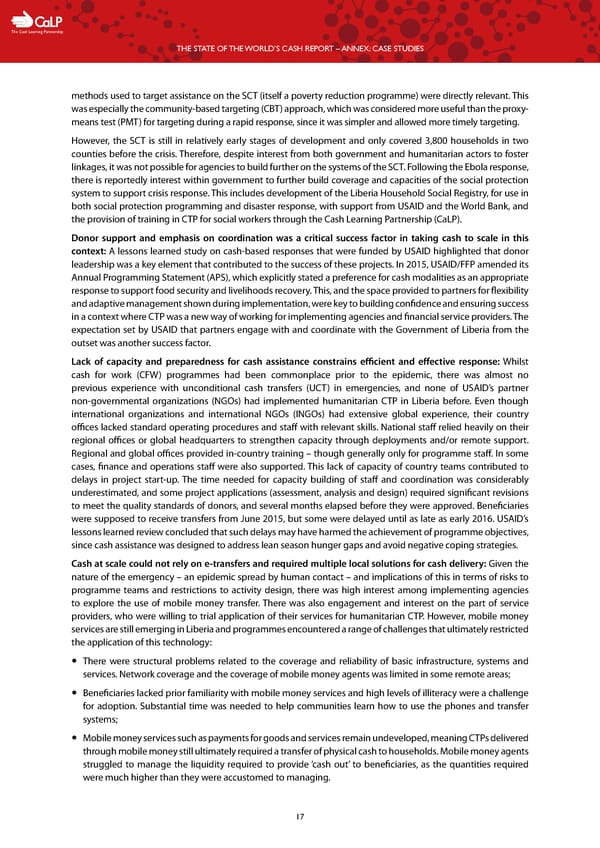C The Cash Learning Partnership THE STATE OF THE WORLD’S CASH REPORT – ANNEX: CASE STUDIES methods used to target assistance on the SCT (itself a poverty reduction programme) were directly relevant. This was especially the community-based targeting (CBT) approach, which was considered more useful than the proxy- means test (PMT) for targeting during a rapid response, since it was simpler and allowed more timely targeting. However, the SCT is still in relatively early stages of development and only covered 3,800 households in two counties before the crisis. Therefore, despite interest from both government and humanitarian actors to foster linkages, it was not possible for agencies to build further on the systems of the SCT. Following the Ebola response, there is reportedly interest within government to further build coverage and capacities of the social protection system to support crisis response. This includes development of the Liberia Household Social Registry, for use in both social protection programming and disaster response, with support from USAID and the World Bank, and the provision of training in CTP for social workers through the Cash Learning Partnership (CaLP). Donor support and emphasis on coordination was a critical success factor in taking cash to scale in this context: A lessons learned study on cash-based responses that were funded by USAID highlighted that donor leadership was a key element that contributed to the success of these projects. In 2015, USAID/FFP amended its Annual Programming Statement (APS), which explicitly stated a preference for cash modalities as an appropriate response to support food security and livelihoods recovery. This, and the space provided to partners for flexibility and adaptive management shown during implementation, were key to building confidence and ensuring success in a context where CTP was a new way of working for implementing agencies and financial service providers. The expectation set by USAID that partners engage with and coordinate with the Government of Liberia from the outset was another success factor. Lack of capacity and preparedness for cash assistance constrains efficient and effective response: Whilst cash for work (CFW) programmes had been commonplace prior to the epidemic, there was almost no previous experience with unconditional cash transfers (UCT) in emergencies, and none of USAID’s partner non-governmental organizations (NGOs) had implemented humanitarian CTP in Liberia before. Even though international organizations and international NGOs (INGOs) had extensive global experience, their country offices lacked standard operating procedures and staff with relevant skills. National staff relied heavily on their regional offices or global headquarters to strengthen capacity through deployments and/or remote support. Regional and global offices provided in-country training – though generally only for programme staff. In some cases, finance and operations staff were also supported. This lack of capacity of country teams contributed to delays in project start-up. The time needed for capacity building of staff and coordination was considerably underestimated, and some project applications (assessment, analysis and design) required significant revisions to meet the quality standards of donors, and several months elapsed before they were approved. Beneficiaries were supposed to receive transfers from June 2015, but some were delayed until as late as early 2016. USAID’s lessons learned review concluded that such delays may have harmed the achievement of programme objectives, since cash assistance was designed to address lean season hunger gaps and avoid negative coping strategies. Cash at scale could not rely on e-transfers and required multiple local solutions for cash delivery: Given the nature of the emergency – an epidemic spread by human contact – and implications of this in terms of risks to programme teams and restrictions to activity design, there was high interest among implementing agencies to explore the use of mobile money transfer. There was also engagement and interest on the part of service providers, who were willing to trial application of their services for humanitarian CTP. However, mobile money services are still emerging in Liberia and programmes encountered a range of challenges that ultimately restricted the application of this technology: — There were structural problems related to the coverage and reliability of basic infrastructure, systems and services. Network coverage and the coverage of mobile money agents was limited in some remote areas; — Beneficiaries lacked prior familiarity with mobile money services and high levels of illiteracy were a challenge for adoption. Substantial time was needed to help communities learn how to use the phones and transfer systems; — Mobile money services such as payments for goods and services remain undeveloped, meaning CTPs delivered through mobile money still ultimately required a transfer of physical cash to households. Mobile money agents struggled to manage the liquidity required to provide ‘cash out’ to beneficiaries, as the quantities required were much higher than they were accustomed to managing. 17
 The State of the World's Cash | Case Studies Page 18 Page 20
The State of the World's Cash | Case Studies Page 18 Page 20